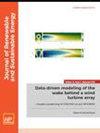探索中国农村地区使用清洁能源减少环境排放的行为意愿驱动因素:UTAUT2模型的扩展
IF 1.9
4区 工程技术
Q4 ENERGY & FUELS
引用次数: 0
摘要
在双碳目标的背景下,农村地区采用清洁能源是实现农村地区有效减碳的重要基础。本研究以技术接受与使用统一理论(UTAUT2)为基础,采用结构方程模型研究农村清洁能源采用行为的影响因素。研究结果如下(1)农村清洁能源采用的预期效果和采用行为均与农村清洁能源采用意愿正相关,而其他因素均与农村清洁能源采用行为负相关。采用清洁能源的意愿对农村清洁能源采用行为的影响最大。(2)清洁能源采用的预期效应、与清洁能源采用相关的主观规范、清洁能源采用的便利支持和与清洁能源采用相关的习惯对清洁能源采用意向的影响具有部分中介效应。采用清洁能源的可靠性对清洁能源采用意向的影响具有完全中介效应。采用清洁能源的感知价值对清洁能源采用意向没有显著的中介效应。(3) 年龄对感知价值、相关行为和采用清洁能源的意向有明显的调节作用;教育程度对促进支持和采用清洁能源的意向没有明显的调节作用;地区对促进支持和采用意向没有明显的调节作用。本文章由计算机程序翻译,如有差异,请以英文原文为准。
Exploring drivers of behavioral willingness to use clean energy to reduce environmental emissions in rural China: An extension of the UTAUT2 model
In the context of the dual-carbon target, the adoption of clean energy in rural areas is an important basis for achieving effective carbon reduction in rural areas. On the basis of the Unified Theory of Technology Acceptance and Use (UTAUT2), this study uses structural equation modeling to investigate the influencing factors of rural clean energy adoption behavior. The results are as follows: (1) Both the expected effect of rural clean energy's adoption and adoption behavior are positively correlated with intention to adopt rural clean energy, whereas the rest are negatively correlated. The willingness to adopt clean energy has the greatest impact on clean energy adoption behavior in rural areas. (2) The expected effect of clean energy's adoption, subjective norms related to clean energy's adoption, facilitation of clean energy adoption support, and habits related to clean energy adoption have partial mediating effects on the impact of clean energy adoption intention. The reliability of clean energy's adoption has a full mediating effect on the impact of clean energy adoption intention. The perceived value of clean energy adoption has no significant mediating effect on the intention to adopt clean energy. (3) Age has a significant moderating effect on perceived value, related behaviors, and intention related to adopting clean energy; education level has no significant moderating effects on facilitation support or intention to adopt clean energy; and region has no significant moderating effects on facilitation support or adoption intention.
求助全文
通过发布文献求助,成功后即可免费获取论文全文。
去求助
来源期刊

Journal of Renewable and Sustainable Energy
ENERGY & FUELS-ENERGY & FUELS
CiteScore
4.30
自引率
12.00%
发文量
122
审稿时长
4.2 months
期刊介绍:
The Journal of Renewable and Sustainable Energy (JRSE) is an interdisciplinary, peer-reviewed journal covering all areas of renewable and sustainable energy relevant to the physical science and engineering communities. The interdisciplinary approach of the publication ensures that the editors draw from researchers worldwide in a diverse range of fields.
Topics covered include:
Renewable energy economics and policy
Renewable energy resource assessment
Solar energy: photovoltaics, solar thermal energy, solar energy for fuels
Wind energy: wind farms, rotors and blades, on- and offshore wind conditions, aerodynamics, fluid dynamics
Bioenergy: biofuels, biomass conversion, artificial photosynthesis
Distributed energy generation: rooftop PV, distributed fuel cells, distributed wind, micro-hydrogen power generation
Power distribution & systems modeling: power electronics and controls, smart grid
Energy efficient buildings: smart windows, PV, wind, power management
Energy conversion: flexoelectric, piezoelectric, thermoelectric, other technologies
Energy storage: batteries, supercapacitors, hydrogen storage, other fuels
Fuel cells: proton exchange membrane cells, solid oxide cells, hybrid fuel cells, other
Marine and hydroelectric energy: dams, tides, waves, other
Transportation: alternative vehicle technologies, plug-in technologies, other
Geothermal energy
 求助内容:
求助内容: 应助结果提醒方式:
应助结果提醒方式:


